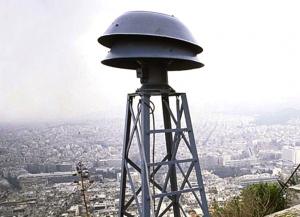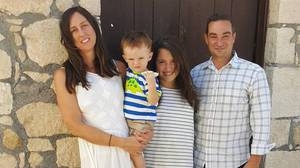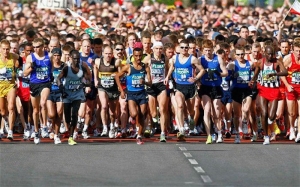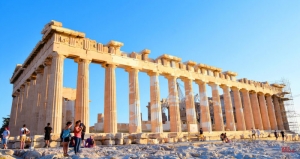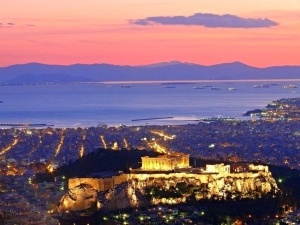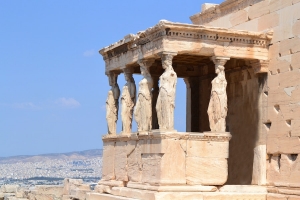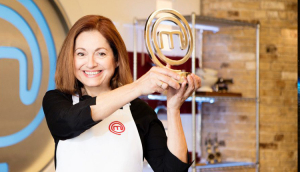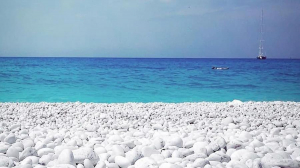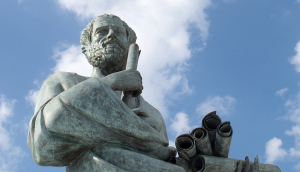BUSINESS CENTRE
XpatAthens
Monday, 05 October 2015 14:41
Civil Defense Sirens Will Sound Across The Country On Tuesday October 6th
Civil Defense sirens will sound across the country on Tuesday October 6th in the morning. The sirens will be sounded for routine checks and to ensure that they are in good operation; the sirens are part of the large-scale military exercise called “Parmenion 2015”.
As announced, the air raid sirens will ring at 11 am, for sixty (60) seconds and will end at 11:05 with a 60-second constant intense sound. The public is to be assured that this is a routine check and there is no cause for concern.
Source: TaNea
Translated by: XpatAthens
Published in
Local News
Tagged under
Saturday, 10 September 2016 21:46
A Canadian Family Trades The Concrete Jungle For A Life In Crete
Melanie Hawco had traveled to Greece before she met her husband and fell in love with the country. After they met, they traveled to Greece every year for four years, and finally decided to make the move permanently in 2016. Here’s their story!
I had lived in Toronto for seven years. I have my business degree and had worked in social work in Cape Breton. In Toronto, the job market just kind of geared me towards working with the adult population to teach financial literacy. But it was extremely stressful. Adrian worked at the same restaurant as my brother. That’s how we met. We both share a love of travel, so immediately we started talking about travelling the world.
We’ve been married for three years. Now we live in a little village just outside the city of Heraklion. The village has only 150 people. We’re in the mountains. The view from our balcony is unbelievable. It’s all farmland.
My daughter is turning 13 soon, so the change for her is a little more difficult. But she’s getting along great, too. In September she’s enrolled in an English-speaking school. The baby is almost two.
We own property on a mountain close to us. We have 30 acres of farmland that has lemons and walnuts and other produce on it. We just started a cooking school and in September we are going to be farmers.
We had one run of the cooking school that is out of our village. It’s really amazing. In Toronto, I hardly ever saw my husband. We worked separate hours. But here, we’re working together. Adrian is an amazing chef.
Personally, my stress level is completely lower. We’re starting up a new business and a new life so of course there is going to be stress. But when I look around I see the beauty of the place I want to be. Last night I was walking the baby and there was a wedding party in a little square in our village. I could hear the music and I was looking up at the stars.
Our daily routine involves a lot of work setting up the business. We get up, my son eats his four bowls of cereal and right now there’s a lot of shopping and preparing – getting the tables and chairs and cutlery for the cooking school. The beauty of it is, we always have our bathing suits in the car so after shopping we go to the beach and jump in the sea. We always make sure we have at least half an hour to jump in the water.
We’re paying way less rent for our house here than we paid in Toronto. We have a balcony in the back and a wood-fired oven that we’re learning to use.
I’m really excited about September. I’m not nervous at all, which I think comes when you really feel like you’re in your place and living your dream.
Article Source: The Global And Mail
Article Source: The Global And Mail
Published in
People
Tagged under
Thursday, 10 November 2016 07:00
Over 50,000 Athletes Expected In This Year’s 34th Athens Marathon
More than 50,000 athletes will participate in the 34th Athens Marathon, which will be held on November 13th, 2016 following the historic route of Pheidippides, the dispatch-runner who brought Athens news of the Greek victory against the Persians at Marathon and then collapsed.
The president of the Marathon’s organising committee and SEGAS chief Kostas Panagopoulos said, “We’re happy this year to have more than 50,000 runners, but I want to tell you with great sincerity that I think we are just after halfway in relation to the goals we have set for the Athens Marathon. The goal is high. We want the Athens Marathon to be the most important cultural and sports festival in the world.”
He added, “We estimate this leaves the city an amount of around 15 million euros from which benefits not just the tourism industry, but also Athens’ daily life.”
To read this article in full, please visit: Greek Reporter
Published in
Local News
Tagged under
Thursday, 15 March 2018 07:00
8 Things You Didn’t Know About The Acropolis
The Acropolis of Athens is one of the most famous and influential landmarks in history. The naturally fortified site houses the greatest architectural influence of modern civilisation and symbolises the birthplace of democracy. While there is evidence that the Acropolis was inhabited as far back as 3,500 BC, it was Pericles, the democratic leader of Athens in the 4th century BC, who oversaw an ambitious construction program of the buildings and monuments that exist on the Acropolis today. And now, Why Athens shares the secrets of the Acropolis you may not have known until now!
The Temple of Athena Nike
The Temple of Athena Nike overlooks the entrance to the Acropolis and was constructed during Pericles’ building program in 426BC. The temple was a replacement for a 6th century BC dedication to Athena Nike which was constructed of wood but destroyed by the Persians. It survived virtually intact for 2,000 years, until 1686 when the Ottomans demolished the temple to use the marble as a fortification wall on the Propylaea. The wall was removed and the temple reconstructed to its former glory in 1834 after the Greeks regained their independence.
The Vastness of the Acropolis
When the ancients first saw the rocky land mass which we know as the Acropolis, they must have been amazed by the perfection of its oval top. Measuring 350 metres long and 150 metres wide (52,500 square metres), it must be visited and walked to understand the true scale and uniqueness of the ancient site. Each year over 2 million people climb the Acropolis.
To read this article in full, please visit: Why Athens
Published in
Greek Language & Culture
Tagged under
Friday, 10 November 2017 10:10
August 22 - A Never Ending Summer
We get a second serving of summer in this issue. See the moon rise over Cape Sounion, discover where old meets new in Athens, and learn about Greece's disappearing whistle language!
Please click HERE to view this issue of our newsletter!
Remember to stay connected with us through our weekly newsletter, Facebook, and Twitter!
Remember to stay connected with us through our weekly newsletter, Facebook, and Twitter!
Published in
Newsletters
Tagged under
Monday, 23 July 2018 09:01
Acropolis To Close Early As Heatwave Continues In Athens
Much of Greece has been hit by a heatwave and as temperatures are expected to reach over 40 degrees on Monday July 23, the Acropolis will close early again.
The Acropolis and Dionyssos Theater closed early on Sunday, July 22 and will close on Monday July 23 at 14:00 in order to protect staff and visitors from the dangers on heatstroke.
Visitors who have already purchased tickets online can visit any of the ticket issuing posts and exchange for a different date.
Source: Greek City Times
Published in
Local News
Tagged under
Tuesday, 02 April 2019 07:00
UK MasterChef Final Filled With Cretan Flavors
This season’s UK MasterChef was filled with the aromas of Cretan cooking.
In fact, the 61-year-old winner, Irini Tzortzoglou, took inspiration from her Greek childhood on the island of Crete.
Irini competed in the show's first all-female final and said she wished she could share her trophy with her fellow finalists. Her winning 3 course menu consisted of red mullet and squid risotto, rosemary lamb chops and a fig & hazelnut baklava.
Even though Irini impressed some of the biggest names in the UK food industry with her delightful dishes, her plans do not involve starting up her own restaurant.
Instead, she stated that she hopes to be able to spend some more time in Greece, explore her home country, and maybe make a television program.
To read this article in full, please visit: bbc.com
Photo: MasterChef UK
Published in
Greece In The News
Tagged under
Tuesday, 11 June 2019 16:06
June 11 - Dive In & Refresh
With summer having already made its way towards us, you won't want to miss our tips for a healthy detox before hitting the beach in the morning and our selection of the top roof gardens in Athens!
Please click HERE to view this issue of our newsletter!
Published in
Newsletters
Tagged under
Monday, 06 January 2020 11:50
Harvard’s Greek-Themed Online Course Attracts More Than 40,000 Participants
Through EDX, an innovative online learning platform, Harvard University will be offering a free online course called "The Ancient Greek Hero." To date, more than 40,000 candidates have registered for the class that starts on January 9th, 2020.
Here is a brief description of the course:
'Explore what it means to be human today by studying what it meant to be a hero in ancient Greek times.
In this introduction to ancient Greek culture and literature, learners will experience, in English translation, some of the most beautiful works of ancient Greek literature and song-making spanning over a thousand years from the 8th century BCE through the 3rd century CE: the Homeric Iliad and Odyssey; tragedies of Aeschylus, Sophocles, and Euripides; songs of Sappho and Pindar; dialogues of Plato, and On Heroes by Philostratus. All of the resources are free and designed to be equally accessible and transformative for a wide audience.
You will gain access to a supportive learning community led by Professor Gregory Nagy and his Board of Readers, who model techniques for "reading out" of ancient texts. This approach allows readers with little or even no experience in the subject matter to begin seeing this literature as an exquisite, perfected system of communication.
No previous knowledge of Greek history, literature, or language is required. This is a project for students of any age, culture, and geographic location, and its profoundly humanistic message can be easily received without previous acquaintance with Western Classical literature.'
Published in
Greece In The News
Tagged under
Friday, 08 May 2020 15:46
Mission & Values
Our platform is all about creating and inspiring real, honest, and authentic connection, where honorable work gives life, health and happiness to everyone. We aim to live globally, connect people, bridge cultures, and share knowledge.
We believe that sustainable community creates sustainable economy, which provides us all with a sustainable existence. Our organization creates community, provides community, and supports community – globally and locally – virtually and physically.
We believe that sustainable community creates sustainable economy, which provides us all with a sustainable existence. Our organization creates community, provides community, and supports community – globally and locally – virtually and physically.
We love living globally and contributing locally!
OUR MISSION
Our mission is to create and support, connect and develop local communities - their people, businesses, educational systems, social structures and organizations.
OUR CORE VALUES
- Consciously, sustainably, and creatively building physical and digital community.
- Global connection through local living.
- Respect and acceptance of all local cultures, their land and their people.
- Moving about the globe respectfully, with care, awareness, and with low impact on local communities and our Earth.
- Balance, harmony, excellence, responsibility of self, and compassion for others.
WE BELIEVE IN
- Global citizens with unique cultures.
- The ease of communication and understanding, and the growth of knowledge between all people and their cultures.
- Bridging people, knowledge and information.
- The continued improvement of our lives and the lives of others in the communities that we live in, as well as the communities that we visit.
- Sustainable communities to create sustainable economies to create sustainable existence.
Learn about ways to support us or get in touch with us directly.
We welcome you to join us and become part of the community in Greece!
Stay connected with us through our newsletter, on Facebook, Instagram and LinkedIn.
Published in
About Us
Tagged under


